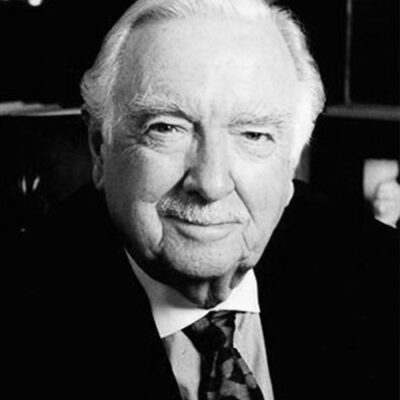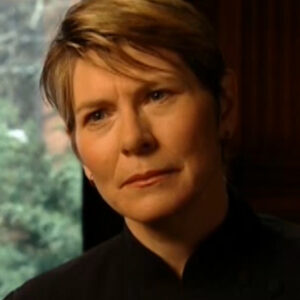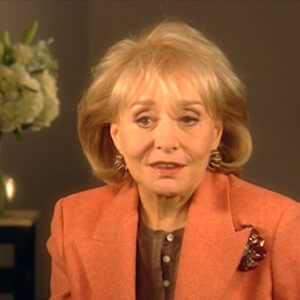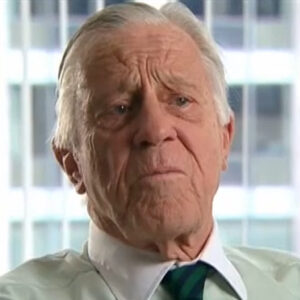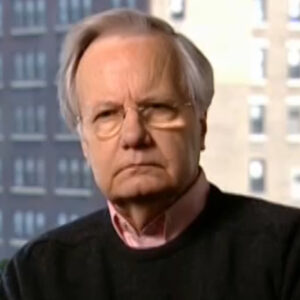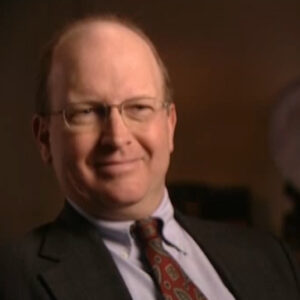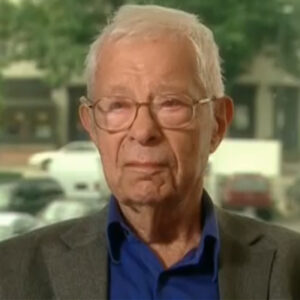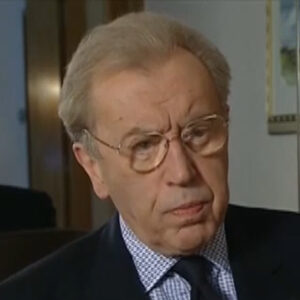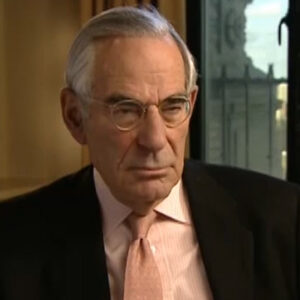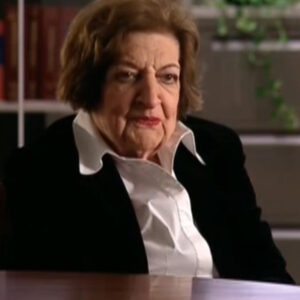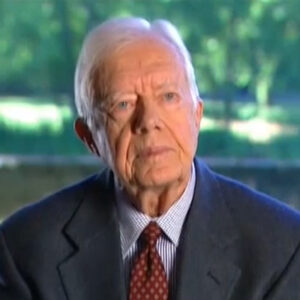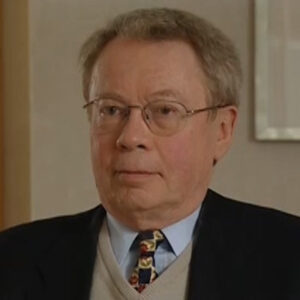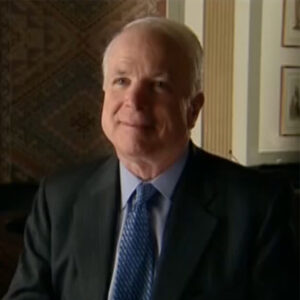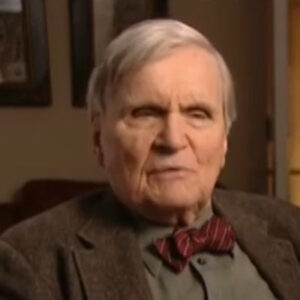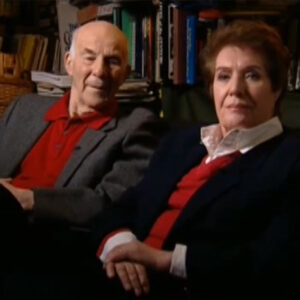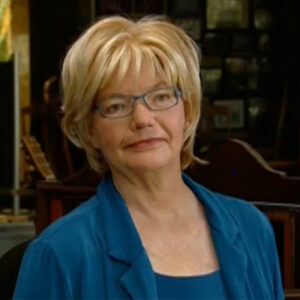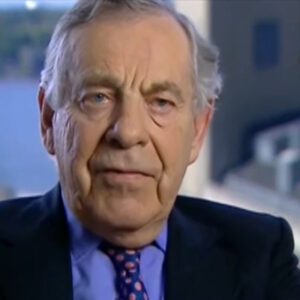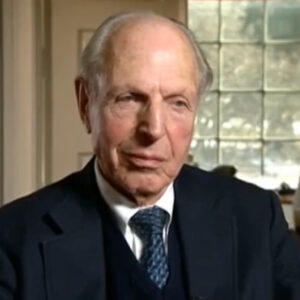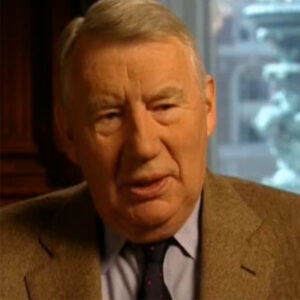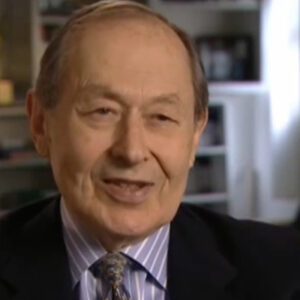Speaker Well, of course, all war correspondents, if they were truly war correspondents, were out with the troops. We’re taking those risks, some of the risk for a little greater perhaps than others, some more spectacular examples of risk.
Speaker But everybody took them riding a glider into combat. There’s no way to go to war. I decided that I had no intention of going by glider. I thought I’d be going by parachute. I took parachute training, very elemental training in the British Isles. You couldn’t practice parachute landings all over the British Isles because the Home Guard, with their guns. We’re all we’re all told. Shoot any at a people coming in by helicopter. I mean, bye bye.
Speaker Yeah, I can hear a little bit. Maybe I can turn down which one of them is louder than the other.
Speaker You weren’t you couldn’t parachute because of you. So well. OK. We have speed.
Speaker There is no way to practice parachute landings in the British Isles because there were there, the Home Guard was throughout the island, of course, and there are there orders were to shoot any any parachutes they saw landing. The fear was, of course, the German landings. And since that was the rule, there was no way to practice it except by just a..
Speaker A simple standard where you went up a little way and just dropped a little way just to do a sample how it was to land. That was all they could really train you. And on the British Isles.
Speaker When you were covering the Battle of the Bulge as Germans invaded Belgium, the battle was Germany’s last gasp. Usually you said usually we see now the faces of Americans, so we see now the faces of American soldiers in the terrible cold and snow of December 1944. You must have seen with your own eyes the faces of German soldiers. And, you know, during during that that last battle and I just wondered what your reactions, what your thoughts were about that experience and the Battle of the Bulge.
Speaker Reactions in what sense, I mean, looking at the faces, I mean, you were in the middle of that battle and you were with the American soldiers. But you must have seen the faces of German soldiers. And I just wondered what. What are your feelings?
Speaker Well, of course, when we saw German Schroder’s, our side was shooting at them and they were shooting at us for that matter. The German soldiers were tough, well trained.
Speaker And when I went to war and were on the salt, as they were with the Battle of the Bulge, they were terrible, terrible fighters for honor as we were. We were concerned. They were terrible.
Speaker What did you feel like, the last gasp? Did you feel like there was a desperation?
Speaker What did you feel like there was this sort of sense of desperation?
Speaker Well, the German effort was certainly rather clearly meant to be a great last effort.
Speaker They were planning to get across Belgium and seize the ports on a coast. And they’re from there launched a whole new series of attacks that would eventually reach Britain.
Speaker It was a very serious effort on their part and they put put everything they had into it. When we stopped them, that was really the end of the war.
Speaker And what was your view? I mean, it must have been a terrifying experience.
Speaker You were right there in the middle of the battle, certainly as a war correspondent who goes in with the troops, who was in battle, many war correspondents, but a lot of time in the foxholes with the troops getting the stories certainly firsthand, sharing the same dangers that the soldiers themselves were facing, except the soldiers eventually went out of the pits and to the open to fight a war correspondents. They could hang back for a little while until it was reasonably safe to move on to the next foxhole.
Speaker Now, during that personally, during those war years. Who were you writing to during the war? Who are you keeping in touch with at home during the war?
Speaker Well, we had something called v mail, which was a reduced picture of the letters so that a lot of them could be transmitted to the United States, carried by five ships across and or mail from our loved ones at home or reached whatever address we had.
Speaker It was rather difficult to exchange letters. Sometimes they were quite delayed. But most of those of us over there set a lot of e-mail. I’m ashamed to say I didn’t do as much of that as I should have. And Betsy, my wife and my mother were rather disappointed that I didn’t send more e-mail to them.
Speaker She just.
Speaker The problem was there really wasn’t much you could say in the e-mail because there were secrets all in the in our coverage. And actually, I felt that if worst by stories got printed at all, particularly in the hometown paper in Kansas City and other areas, they would get more than they would through an e-mail anyway.
Speaker Walter, clear your throat a little bit. Just do your coughing thing.
Speaker Carrying credit.
Speaker Just to finish up to you, what that was had lost so many had changed the lives of so many people for you, how did it change your life? Well, you did you were you profoundly affected by it? And did it change your life in some way, your view of the world?
Speaker Well, it changed my life considerably. And the opportunity I had as a reporter in Europe to get a byline in many newspapers and to get some pretty good stories out. Of course, you know, Karen, I get some applause from the folks back home. So I changed my life a lot as it did, of course, a lot of soldiers who found whole new jobs that they could go to when they came home.
Speaker What did you feel from an emotional standpoint? Kind of personal. Your view of humanity and what you had experienced in that war, reporting that more? Did you feel that it changed your view of mankind or any of that kind of thing?
Speaker Oh, I suppose that changed my view of mankind to some degree. There was such brutality in war, whether it’s done fairly or not so fairly by our own people and the enemy. But you learn you do learn certainly the depths to which people must go when they are cast into war. And it certainly isn’t a very happy scene. You can be proud of the heroes. You can be proud of, though, those who stuck with their guns at those difficult circumstances. But that was only the the flashpoint a war.
Speaker It wasn’t something you would expect anybody to be taking to civilian life when the war was over.
Speaker After that, you were you were reporting on Nurnberg, and I was wondering when you watched the other people were put on trial. What did you see in their faces? What what did what was sort of the whole mood of those trials?
Speaker Well, as you heard their stories, I’m sorry, Walter, I know you have the subject matter.
Speaker So I know what we’re talking about. So if you could say the Nuremberg trials, so we know what we’re talking about.
Speaker I know.
Speaker Well, the Nuremberg trials, of course, were an exceptional experience for all of us here in the dock where the arch enemies of all time, they those who planned the war, who planned the massacre of the Jews and other peoples, here were these faces that we looked at every day as they heard their own stories repeated by other witnesses of their themselves.
Speaker And it was difficult to look at them and believe that these were as terrible as they as they had proved to be in the murder of millions of people, both in battle and in concentration camps. It was hard to accept that these were human beings. Most of them looked like it. You would you wouldn’t perhaps pick them out on the street as the villains they were. But when they were lined up in that dock and you watched them every day as they heard some of their own horrible stories recited and recited themselves, in some cases, you you you really found it hard to believe. I did. They didn’t look like the criminals that they were, the murderers that they were you you would let them pass in the street, certainly without believing that they were could be capable of what they had done.
Speaker He said that this was one of the highlights reporting on this was one of the highlights of your career. What?
Speaker Why was it a highlight? Was it the nature of the stories that you were writing? Against the growth said that it was one of the highlights of your career reporting on the Nuremberg trials. Can you tell me why and in what sense? It was a highlight?
Speaker Well, where we’re bringing to justice in this trial the people that had organized and committed these terrible crimes of the concentration camps, of the roundup of the Jewish people and other peoples and their cruel murder of their children and the adults themselves. I mean, these people were the worst criminals who ever lived in mass as they got together and carried out their hit, Larry, and plans. It was not a pretty scene to see them in the dark. It was there is some compensation for it when we saw them in tears themselves or what they had done. But whether the tears were or what they had done to their victims or crying because they knew darn good and well that that evidence being presented in that court was going to cause them to be hanged to.
Speaker Was there anything was there anything that really surprised you? I mean, was there something that you didn’t expect when you were watching those trials? Was there anything that surprised you?
Speaker Well, I don’t think so. They reacted as about you would expect those who knew that they were going to the gallows. They didn’t have any doubt about it. I don’t think most of them they would tried to defend themselves. Of course, they tried to claim when they were in the witness chair that they didn’t know about these things. Incredibly, even gerring claim that he didn’t know about some of them, which was, of course, perfectly ridiculous. Rudolf Hess was in the dock and he was clearly out of his mind by that time. He didn’t really seem to realize what was going on. He was sitting next to Gary and Gary and we kind of looked at him and shake his head like, oh, you poor fool. I know you’re already you understand what happened. It was touching. I was say day by day.
Speaker Now, you went from the biggest story, which was World War two and to the next big story, which was the Cold War. And I wondered if you could talk a little bit about that, about the Cold War and your experience in Moscow.
Speaker Well, Bosko, of course, was in terrible shape one way or when I went there immediately after the war, I had lost almost everything that people didn’t have enough food, clothing, shelter, any transportation, nothing of the kind. I was destitute circumstances having been left that way in the shadow of war. It wasn’t that we didn’t see in our two years there. And my wife and I did not see the Russia that others had seen before the war. And we’d see again in later days. We saw a corrupt country that were capital that really had nothing. Barely enough to survive. We had a woman, a Finnish woman, who was our cook as she went out in the mornings with her, felt blank on the shoes. They wore wrapped robes and stood on street corners where it was reported that there might be a truck with food coming. And all these old ladies stood there and waited in the cold, in the snow till a truck came up and then sold a few things off the truck and they would come home and put it in a pot, try to make something edible out of whatever they had bought. It was not what I’d call fly living.
Speaker Now, when you went on that assignment, did you have certain expectations? And then what happened when you got there? Did you find out that it wasn’t at all what you expected?
Speaker No, I think I pretty well expected what we got. I may have been worse than I really thought it would be. But I anticipated it. We’d read about it. I’ve been told about it by our correspondents who’ve been there. So I was not surprised in any way.
Speaker When I read your account of life in the USSR, I got the impression that you weren’t a die hard cold warrior even when you could have been. Can you tell me about this?
Speaker I didn’t get the quotes. It really didn’t seem to be a diehard cold warrior when you were. I mean, I’m just wondering when you could have been with all that you had been through in World War Two. And then after. And the aftermath.
Speaker I just wanted to know a little bit why you seem to be more open. You seem to be less sort of rigid in your thinking.
Speaker I’ve I’ve I’ve I’ve got really quite understanding the question.
Speaker Tell me, as you watch what’s going on in the U.S., there seem to be really clear ideological war between the United States and the Soviet Union.
Speaker It seems that in your reporting, you weren’t sort of into that. You weren’t called a die hard Cold War. You and I just wanted to know a little bit about that.
Speaker Well, now, one of the reasons for that and a very big reason for that was the Soviet censorship on everything we wrote was very, very strict. And we were too critical. They just didn’t send the copy back home. They’d cut it or just dismiss it and we could not do anything about it. Once we’d submitted the copy to the censors at the post office, we had no more control over it. They they censored it and transmitted it. That was that was a choice made by the correspondents who were there, four or five of them before I got there. I didn’t think it was a good idea to let the censors go ahead and transmit without our ability to call a copy back. But the other problem of doing that was you as a correspondent had to keep going on foot, drawing in many ways to the post office and get the copy and then try to edit and then resubmitted. It was a difficult process, particularly in the cold winter when you were making that trip to the post office through the snow. You really didn’t want to make more than one trip.
Speaker I now want to turn to race. The race problem in the United States and wanted to know about the whole modern civil rights movement. Do you think it will have been successful or even possible without television?
Speaker Oh, yes. I think probably it would have through the years of television speeding the process considerably.
Speaker And by the daily illustrations of the Miss Carriage of Justice with the blacks and the. That’s brought sympathy across the United States. But that might not have been there if they’d just been reading this story in the newspapers.
Speaker In your book, you talk about your first experience because. When you move to Texas, you talk about some experiences when you became really conscious of the race problem in America. I wondered if you could briefly tell us about that.
Speaker Well, we move there by mother, father and I.
Speaker I was 12 years old at the time and we moved there from Kansas City, which may not have been one of the standard carriers of fairness to our black good buddies. But it was a lot better than the South. Much, much better than the South. And when we moved there, we were surprised at the way the blacks were treated. We learned the lesson very quickly and almost. Our first night in Houston, my father had been brought there to teach at the Delta College and he was invited the first year. Second night we were there to our dinner at his home in the best area of Houston. River Oaks, a new new area. At that time. And we sat on his front porch after dinner and did the usual thing, ordered ice cream. Nobody had electric refrigeration then. So you ordered your ice cream from the drugstore and he ordered some ice cream. And we sat on the front porch waiting for the old delivery boy to bring it. Finally, the motorcycle boy came and he was looking up and down the block for the way to get to the back of his house. That’s what we learned later he was trying to do. But he rode up and down in his motorcycle looking for a way to get to the back. And he couldn’t find it. Couldn’t find a driveway or anything. So he parked the motorcycle and with his little bag of ice cream, crossed the front, the front lawn. And as he got closer and closer to the front porch, our host moved, moved closer and closer out of his seat.
Speaker And I couldn’t tell. But there was obviously some problem there. And when I was a little frightened as a 12 year old boy and he moved forward and forward, and as the black delivery boy put his foot on the step, the doctor who was our host dash from his chair with his foot made up and hit the kid in the face with both.
Speaker This knocked him back from it’s from a step. He was on and he shouted, that’ll teach you and use that N-word to put your step, your foot on a front on a white man’s front porch. It was a terrifying and immediate lesson of race relationships and used in taxes. My father got up, said to my mother, Helen, were leaving water.
Speaker We’re leaving. And our host kept saying, What’s the matter? What’s the matter? Why are you leaving? The kid is getting out now.
Speaker Up out of the lawn and feeding his face. And we we walked out.
Speaker My father said a nice word to him and we walked into the dark. My dad had no idea how we’re gonna get back to our hotel room. We’d just gotten there. Had no idea. We didn’t know where we were in town. There wasn’t much traffic. It was a very secluded district. And we walked through the dark for the longest time. I’ll never forget that walk. And we finally found a busy street where he hailed, finally hailed a ride. And a very kindly people took us downtown.
Speaker But it was quite a lesson. And there was just the beginning of many lessons.
Speaker We we got a house shortly after that. And they the garages, the back alley of the house, all had servants quarters in them, mostly in any way and sermon’s quarters. They had little children. Some of them about my age. And I played with them in the back yard a couple of days until my mother got a phone call saying, you know, this is crime guide. If you permit your child to play with those black children set to use your word way, they won’t he will not be permitted to play with the white children.
Speaker And my mother took umbrage at that, my father did, but there wasn’t much to do about that. That was the society.
Speaker And that experience, obviously, the experience that you had living in Houston. You took that with you in life and and did that affect somewhat the way you reported on the civil rights movement?
Speaker I’m sure it did. I’m sure it did. I was very much a believer in the civil rights movement very much. And I tried to get where I could report that story. Unfortunately, I was able to do so in some cases anyway.
Speaker Now we’re gonna move on to Nexen, and I was interested in the speech written by Pat Buchanan.
Speaker Buchanan, Spiro Agnew said, and this is something you wrote in your book. A small group of men numbering perhaps no more than a dozen anchormen, commentator and executive producers settled upon 20 minutes or so of film and commentary. That is to reach the public. They decided, what, 40 to 50 million Americans will learn of the day’s events. What’s wrong with that statement?
Speaker Just a bit. I remember, I remember, I do.
Speaker Do you want this is what I do. This is what Agnew said. And I was wondering what you thought of this statement.
Speaker Suva’s.
Speaker Thank you.
Speaker Nothing is wrong with that statement.
Speaker But it’s true that that the three networks we anchor people on the three networks and those and local stations certainly played a major role. Wait, I’m talking over this thing.
Speaker I don’t find any fallacy in that statement, although certainly Agnew is capable of them. But in that particular part of the statement written for him, the facts were there. We were indeed the principal source of information for most of the nation. And well, as more and more people bought television sets in the early days in his day, there weren’t that many sets out there. There were probably a majority. But but still there. The country was to become even more wired for four pictures. And our reporting was the principal information they got over the television. The newspapers, of course, were playing their role. But the television news was getting a very big reception right away.
Speaker Nixon felt very much that the press was conspiring in a sense. Thank you very much. We’re not trying to control our reporting.
Speaker Yes, they certainly did. But so do other politicians in office and including presidents and their vice presidents. They all try to control the news that is released about their efforts. This is part of the game. And you can understand that they would I wouldn’t blame them, but we were trying to report it as we understood it to be without taking sides. What is not up to the journalists, the front page journalists, are they not the network anchor produced by people to distort the news, but only to try to repeat and report it? That was our role. Politicians aren’t always keen for even the straight report. They would rather see a report that promoted their side, but not just was a fair bit of background report.
Speaker Did you ever have the experience in your career as a person, you felt pressured by anybody to modify your reporting?
Speaker Quite frankly, never. It is hard to tell people.
Speaker Hard to tell students, journalists. Hard to tell. People in foreign countries that we are reporting was not influenced particularly by the sponsors, the people who paid our way. But I never heard of anybody having that problem with the major networks, maybe with some local stations from time to time. It did happen, but not on the networks. I was never once told I could or could not report a story because it might offend an advertiser. It never happened in my entire career.
Speaker That’s quite different from today. That true?
Speaker No, it’s not true as far as I know I am I am not daily involved. But I have not heard that there is any network or any business interference with what the network news people can report. I’ve never heard a single complaint of that.
Speaker Politicians or or even the White House ever call CBS the management at CBS to pressure them to sort of. Modify or just or censor somewhat what you were trying to report.
Speaker Well, the press secretaries in the White House. Their job was to try to explain to the media what a particular story was like, what the view of the White House was. That was their job. And there were other public relations people around in the capital in the Congress who had that role. So we heard from them all the time. But that was simply another news source. They simply dumped on us. What they’d like to think we would be reporting and some time. And sometimes are. In fact, frequently their information was helpful in rounding out the story.
Speaker But it didn’t succeed in changing any facts we had in our reporting. I don’t recall that. There are my competing networks CBS had with NBC and ABC. I don’t recall any of those correspondents and not work. People are saying they’d had any interference in that way or interference from business, from from sponsors.
Speaker There were people most suspected that we were we were influenced as far as CBS was concerned.
Speaker And I’m quite sure as far as the other two networks and the more responsible cable networks were not affected by the sponsors, I would never read a single case of the sponsors interfering with our broadcast.
Speaker Now, I want to go to Vietnam and ask you a little bit about the string of factors that led you to change your mind about Vietnam, because when you first reported and you went to Vietnam was very different from the second time you went. I wondered if you could talk to us a little bit about that process.
Speaker Well, in the first case, when they when we first sent our troops into Vietnam, answering an appeal by the French had been driven out of northern Vietnam, that we saved something of the country for them, it in effect, was what they were saying. And, of course, we accepted it. President Kennedy got us involved in that thing and that the thought was that we could save southern the southern part of the country as a democracy. Well, of course, the problem was we found out only after we got in there which one of the great mistakes of all time, not too unlike some of the mistakes being made in Iraq.
Speaker But the whole idea was to save democracy. Well, there wasn’t any democracy in that monarchy and a rather cruel one. And Meat Week started pouring troops in there to try toes to stabilize this corrupt monarchy. Obviously, we were disillusioned, but that was that was where the mistake was taken. Instead of withdrawing and saying that was a mistake. Nobody admits it was a mistake, particularly after we lost even a few lives. So we were dedicated, it turned out, to making the mistake of trying to save South Korea for some time. We hope a democracy which did not exist there when we were fighting in the.
Speaker Can you pick that up? Somebody said it’s South Korea. You meant South. South Vietnam.
Speaker That upset me.
Speaker I’ll tell the whole story. Is there anything else you want to add to? And in the Creary. No, I was fine. That was great.
Speaker Well, of course, when President Kennedy and others committed our troops to going to South Vietnam, we went with the pretense that we were going to save South Vietnam for democracy. Well, actually, there were no democracy there to save. It was a very cruel monarchy and we only discovered that apparently after we got there. Another one of our major mistakes from Washington. And we were stuck there then with our troops. And once we began losing just a few of them, we were then stuck there and trying to prove that we were there for a cause and hoping that we would end our victory, be able to turn South Vietnam over to democratic forces. We were never able to do that, of course. And the North Vietnam obviously defeated us in the end.
Speaker Now, can you tell us, do you remember the conversation you had with Jack at the hotel in Saigon? When you were on the roof of the hotel and you talked about you were talking to Jack Lawrence, do you remember that conversation you had with him?
Speaker No, I remember, of course, Jack Lawrence, of many conversations with him. But if there was one in particular that you’re referring to, you’re going to have to do so.
Speaker I’ll ask him what it was around tattooists after the second trip. And I guess you were talking with Jack Lawrence and he was telling you about his experience in the field with the troops. I guess what we’re trying to do is just find out a little bit more about what happened to you in that second trip. What did you see that really changed your position on Vietnam and made you so strong that you actually spoke about it in your news report, the second trip droids you’re referring?
Speaker Well, maybe not my second trip, but it was the trip when I went there for the Tet Offensive when the North Vietnamese had mounted this massive offensive. And we’re driving back south, deep into the south sort of line there, all of the north. And once it was seen as being defeated and retreating in the circumstance, of course, changed my view quite a lot. My view was we couldn’t hold militarily very much Vietnam. And it was my suggestion then in the broadcast I did was that since I did not see victory in the cards, it was seemed to me time to negotiate and negotiate as people and tried our best to save those people in Vietnam and to create a democratic situation for them. Got our best. We have lost a lot of blood, a lot of gold, a lot of money in the effort. But it was time for us to say we have done our best, but we have had to leave.
Speaker Now, for you who have always been so middle of the line, you know, being as objective a reporter as you possibly could. How is it that you. I mean, what happened to cross that line and make that statement, which had such a profound effect?
Speaker Well, actually, my boss at CBS News, Dick, slammed a man who never permitted us to go to issue a personal opinion about anything. Everything had to be straight news, not editorial, except when it was labelled as editorial by certain commentators. The ad. But I came back to do a documentary about the Tet Offensive with no intention of being able to say those things about my belief in it or lack of belief in it. The case was, but Dixieland called me into his office when I got back and was writing my piece for the four hour documentary and he said, What do you really think about it? And I unloaded with him and he said, you know, I think the American public are so confused. And I think because we know from the amount of letters we’ve had through the years of Vietnam that we have split right down the middle. We’ve got so many letters, pro and con, that we don’t even read them anymore, but they weigh about the same. And since the American public seems to trust in our reporting, I think you ought to tell them that they are confused. They need guidance. I think you ought to write that. Well, I was dumbfounded, but I went right to my typewriter and. And it d had considerable impact when I said that I thought we ought to say we’ve done our best. And it was not quite good enough. And we had to leave.
Speaker I guess you said that the Vietnam War belonged in the American living room. What did you mean by that?
Speaker Well, there were some people who complain about our showing the worst of the war of people, bodies and badly injured and saw a bottle in action. And I came to them at dinner time on the three networks and there were complaints that we don’t have to see all of that. We don’t want to see it. And we don’t believe we should be forced to see it as some holiday would add, particularly at dinner time. I don’t know why dinnertime made much difference, but apparently it did dissolve and we got quite a lot of complaints about it. But never at any time did our management think we should yield to those complaints. This story had to be told. It was the story of our time.
Speaker Tell me, why do you think it was important for people to actually see that story that you just talked about? What about that? Why did you think it was really important for us to really see that story?
Speaker Well, that was partly persuaded by my boss.
Speaker But he is feeling was that we had a particular standing with the American public, that the letters we had gotten showed that we were right down the middle of the road in effect. And and the people were confused.
Speaker The fact we’d taken such a licking from the North Vietnamese in the Tet Offensive. They needed explanation. So that’s what my documentary was about. So we told about how the battle occurred and how the Vietnamese perform north and south. The problem was with the civilians. And also I’ve run I’ve wrapped it up with. And so I believe what we should say, we did our best and we should leave.
Speaker Did you feel that? I mean, do you think it’s true, the press? Do you think the press didn’t lose the war in Vietnam? Do you think the press itself was responsible?
Speaker No. The military would have that. But that’s balderdash. Not at all. It had nothing to do with losing the war. If you have it. But you must admit that we showed the war. And if they believe that that the people were not entitled to know what their young people had been committed to, then they have a little different idea of democracy than we Germans certainly did.
Speaker Maybe they did have a different idea of democracy. A military operation of them should have been up by apparently a secret. Clearly, that is not the way the American people go to war.
Speaker It’s very different than the war that we’re seeing today. The reporting on the war today. You don’t see body bags anymore. The war, the coverage that you’re getting on the war today is very different from the coverage that you got during the Vietnam War.
Speaker Well, it is a vastly different kind of war. It’s been compared to Vietnam and in many ways it is comparable to Vietnam. The fact that Washington stayed in so long kept calling for more troops, more troops, more troops. The there’s a great similarity. There is no to this moment. At any rate, any money plan offered by the White House as to how we’re going to get out of there. So there is similarity in the situation.
Speaker But as far as coverage goes, the war is quite a different war. This war on terrorists is a war that’s very hard to cover. We don’t know where the terrorists are going to show. At any given moment, there is no front line. There is no area held by one group or against another. We we have to accept this new type of war, the terror war. And as such, it’s very difficult for correspondents to cover. We don’t know where the bombs are going to be next. We have suffered losses among art correspondents because we don’t know.
Speaker There is no line of battle. It’s done by this mystery bombing.
Speaker So there is a different kind of war for our correspondent. They can’t get out and cover it as you can to cover a front line, which was where you knew the enemy was. It was it was going to be.
Speaker What do you feel like? There’s more censorship in the military today. You certainly don’t see shots of body bags coming.
Speaker Well, it’s because when the Iber the body bags come back in ones and twos, not in sevens and eights and tens and eleven, whatever. That’s a different, different, different war entirely. And of course, the administration, you know, has never greeted the bodies returning to the United States. That’s still a secret. We know they’re back, but we don’t have pictures of these heroes.
Speaker We hear that they’re heroes, but we don’t see their families, five fighting them coming home.
Speaker I just wanted to ask you to say that the. There are some similarities between the war in Vietnam and the war in Iraq, because you haven’t mentioned Iraq at all. Right. So I don’t know what we’re talking about. So can you just add that one sentence for me?
Speaker You know, there, of course, are similarities to the war in Iraq. Many similarities, particularly in the way it has been handled by Washington itself.
Speaker But getting into the war itself, there certainly is the mistake.
Speaker Take that lightly. There are certainly similarities. On the other hand, the war itself in Iraq is vastly different than the war in Vietnam, which was an old fashioned war, a movement of hundreds of troops, whereas the war in Iraq is the war of terrorists. A few people planted a bomb here and there. Vastly different war than that. And Vietnam.
Speaker Now I want to go to the moon. Switch from here to the moon. You were so prepared for this event. You had done a lot of research and studying. And yet at the at the end of of that, when you did report our landing, you were speechless. Can you talk a little bit about that experience of what you experienced at that moment?
Speaker Yes, indeed, I can.
Speaker I was lucky enough to cover the development of the bar space program from the very beginning. I’d got a little interest of that in England. I’d been bombed out of my apartment in England by a flying missile. And I had some interest in that. Ever since then, when we began building our space program, I took an immediate interest in it. I’d always been interested in aeronautics. And this was next, the next big step in space, of course. And I covered it from the very beginning. I spent a lot of time at Cape Canaveral and other areas where our equipment is being built. Let me get your.
Speaker John Lush. Yes. Did you raise this double? This is her.
Speaker Did you your change train? Was he pick up like the man he picks up a question? I would. One second, just fixing one door.
Speaker We have speed, right? OK, go ahead. Or do you want me to pick this up? Well, you were saying that you have always you you you spent a lot of time at Cape Canaveral and you pick it.
Speaker I suspect a lot of time at Cape Town account of.
Speaker They say they were his interest in there. Let’s bring you up to date, Canaveral, Cape Canaveral.
Speaker Let’s pick it up. We think we should pick it up at the point where you were saying that, know, missiles came in London, hit your plane. All right. Let’s pick up this story right now.
Speaker I had a particular interest in the space program because I suffered the German space program in London. I was indeed bombed out of my apartment in London by one of the flying missiles. And so I realized that they had some value in war and we’d probably be hearing more about it. And as it became a serious contest between the United States and the Soviet Union in getting into space. And presumably because it was thought of as a weapon, it meant that the one who conquered space first would have a certain control over the world, perhaps. So it was a very big story and a very interesting story. And in every part of the development, the choice of our astronauts, the building or our equipment, the test of the equipment. And then the final the the flight by men into space. I covered all of that. And it was the best assignment of all time because we were winning that battle that the Soviets came in pretty quickly, very early, and indeed has some first that we envied. But a week followed through very quickly and very shortly dominated space. To the degree that the Soviets pulled out practically of the contest and we went on to put the first man on the moon. They were Americans. We can be proud of that. And certainly, I believe, was the landing on the moon was that post important story of by far the most important of the 20th century? Nothing compared to it. We had great, great achievements in health. Great achievements in Medicare’s medicine and in medical tools. We had great and great success in other things. The automobile, the the airplane, for heaven’s sakes, telephone, electricity, all of these things. We pioneered and did great jobs with it. But the one most important effort of ours, no doubt, was putting a man on the moon. And I can say that because I can I can be certain that 500 years from now, the date that children will learn will as they live on on these the space cities build out there for them, that they they will they will learn the date that man landed on the moon that the first American did. And I know that because what date do we remember about 500 years ago that happened on our planet? It was Columbus discovering America. That’s the date that every child learns. And the same thing will be true. I’m sure five hundred years from now for those children living on the space cities.
Speaker That’s correct. Now, if you can take yourself back to that day that you reported that you were in that newsroom and here you were, you had studied, you knew everything about. I mean, you knew the subject well. And yet when the first step was taken. You were speechless. Tell me if you can. I was so hard to sort of bring back. But how. How what happened to you?
Speaker Well, what happened to me was that we had achieved this great feat. We had landed the vehicle on the moon and two men had stepped out of it and walked on the moon, for heaven’s sake. Well, I knew we were building for that. It was going to be a great story when it happened. But here now it had happened. And furthermore, television showed it to us. We saw the plane. We saw them step out. We saw them there making a little don’t.
Speaker Little steps on the moon. My gosh, I had been waiting for this moment. Most of us had but to see it happening.
Speaker I just I just had to look at it. I couldn’t say anything. I never did prepare a copy for those things. Not very often. And I certainly had prepared a copy in this case. But there it was, Wally Cheraw, the astronaut who had retired from the program. And we were using as a professional help her. To me, it just was things that I might not know about. He could fill in and he wanted so much to know what I was going to say so he could prepare something. He kept asking me all afternoon, what are you going to say? I said, I don’t know what I’m going to whatever comes to me, I know what the story is. And he said, But I need to know so I can write something. I said, Wally, I don’t. I’m not going to write it. So I don’t know it. And of course, there I am saying, wow, gee, golly, not not going to have any leads at all.
Speaker That’s great. That’s wonderful. Now.
Speaker We’re going to go now to a little bit on censorship, talk about censorship, and one of the most amazing things you’ve said and said repeatedly is that we as citizens not only have a right to know, we have a duty to know, comparing us with the Germans during the Second World War two. Don’t you think that’s a little harsh?
Speaker No, I don’t. I think that the what what run long with the with Germany. Was that the people accepted.
Speaker There was censorship of their newspapers and their radio.
Speaker When they accepted that they accepted the the horrors that were committed by the people who had told them they weren’t entitled to know.
Speaker And I think that the German people were in a way they’re guilty, even though they’d certainly individuals did not participate perhaps in the horrors of Hitlerism. They they permitted them by saying they would accept censorship in their newspapers and radio. At the time, they agreed to surrender free speech. They all already became participants in what the government did in their name.
Speaker Now, do you see that as a danger here in the United States with the fact that people are reading less and less newspapers that are less informed? Do you see? That democracies are a democracy. Do you see any danger in our democracy?
Speaker Yes, I do.
Speaker And democracy only in the sense that people are not educated as well as they should be, which means they are not reading the newspapers as thoroughly or listening to television or radio news as thoroughly as they have. Young people particularly, apparently are a little bored with network news. We find that to be the figures. And that’s that’s a shame. But it’s mostly a shame because there is no proof. They’re also reading the newspapers that they are reading the newspapers at all. You know, the there is a problem that the United States I feel very serious. Maybe, Ahmos, most serious problem is the fact that we are not as educated public as we should be. It takes an educated public to observe in order to adhere to a democracy. And yet we read month by month that other nations, particularly Western European ones, are ahead of us in geometry and in sciences and foreign languages. Certainly they’re way ahead of us are of our students. Well, if we’re so ignorant, I think we’re in danger, serious danger of our democracy, not succeeding as it should be. You know, Thomas Jefferson said at one time the nation expects to be ignorant and free, expects what never can and never will be. We may be in that position where our ignorance is preventing us from exercising our freedoms.
Speaker Want to go back to censorship? What’s the difference between military censorship and political censorship and one more time?
Speaker Well, considerably.
Speaker I don’t think they’re the same thing at all or to be compared military military censorship is to prevent the enemy from knowing what our tactics, what our equipment, what our strength is in the battlefield. But political censorship is denying the information to the American people as to what is going on in their world and in their government. And that is not acceptable. It is not a democratic way.
Speaker Connect to first look at. Now, can you connect us to what happened with the first Gulf War? What, the first Gulf War. The version, the first Gulf. Good luck. The first to the first war, the first Gulf War. What’s going to happen when they Islamic military? I mean, we’re talking about the first Gulf War where the military unit of.
Speaker We won. Well, what do you want to know about it?
Speaker Well, about the censorship, the issue of censorship in that war.
Speaker Well, in the first Gulf War, the there was censorship, of course, there. There has to be a military function. You can’t tell the enemy what your equipment is, what your manpower is, what your losses are.
Speaker That material has to be kept secret. And you, in order to keep it secret, you have to muzzle the correspondents who are there. They unfortunately, in that first war went further than that. And they died as access to the front. They claim that they were certifying some of our correspondents to go, but then they never gave them the transportation and the opportunity to go with the troops.
Speaker We did not get to cover that war. And the first person at all, only after the success and we were able to reconstruct the story did we really know what the military had been up to all that time.
Speaker I’d like to say one thing if I can. I’d like to add a line about that ignorance situation, if I could.
Speaker The ignorance of our country is to be blamed on the fact that our teachers, I think, are not compensated enough so that we get the very best out there. There are teachers who are devoted their lives. We know to a very small income, but they’re they’re making a sacrifice because that’s what they want to do. They know has to be. But by paying them more, we could attract even more talented teachers and perhaps do prove that we can do the same in our schools as those other nations are doing by the records that we are forced to read.
Speaker I guess what I wanted to just get back to what we just were talking about is if you if you want correspondents allowed in or censored by the control of the military, how can you really report and have an accurate history of what’s going on?
Speaker Well, you reported after it’s happened. This is not denying anybody anything, really. I mean, it would’ve been nice if we could report the war shot by shot. But it doesn’t work that way. As I say, you cannot tell the enemy what you’re up to here. So the people are therefore not not able to learn of it as it takes place.
Speaker However, as soon as that battles over, we’re able to say what happened. And the public is then learns precisely what happened in the battle. And they get most of the details accurately and completely.
Speaker Well, yes, I can. Have the I had decided that I no longer wanted to do daily journalism. I never had any intention of leaving CBS at all.
Speaker But I had been a daily journalist since I was 19 years old. And I had a growing family and I had taken up sailing as a hobby and wanted to play a little more tennis. So I decided that I get all the daily news. And I told CBS that when they wanted to renew my contract, I had told them a year in advance that I was only going to do one more year. They didn’t believe me.
Speaker But I made it stick. And last night on the air was a rather tough one for me.
Speaker Really, I, I was like a schoolboy. As a matter of fact, through was scripted there and so. Well, that’s enough of that. Goodnight. I’m going to bed.
Speaker And I’ve cheered my own departure. I don’t think other children as much as I did. But it was great. And I did spend the next couple of years with my children. A lot of people say they’re retiring because they want to spend more time with their families. Most of them, I think, are lying. But in my case, it was true.
Speaker Now, did you and did you ever regret leaving?
Speaker Hmm? Can you tell us about that?
Speaker I can tell you that I regretted leaving every day. There was a good story that came very quickly after I left. I went to Moscow pretty soon after Ice dove down to do the special story. And I was in Moscow when Reagan was shot. And there was a big story and I was in the wrong place and I realized I’d made a mistake.
Speaker Have you talked about when you left your spending more time with your family? I was interested. As to you, when you started your book, your opening of your book, you started with the birth of Nancy. And I wondered, why did you start, but why did you open your book with that story?
Speaker What was the story?
Speaker You opened your book. You started your memoirs. With the story of the birth of Nancy, your first child, I wanted to know why you decided to start your book.
Speaker Well, I think that set the scene really. I, like so many people, feel the life doesn’t start until you begin a family and you produce children.
Speaker And it was a signal event for me, of course, to have our first child.
Speaker As a matter of fact, I flew all the way back from Moscow to be present for the birth of the child. And I found I was a neat or no, but it was a beautiful day in Kansas City. I walked out of the hospital and down the long walk, really, I think coming as close as one can do, dancing on air. It was a great day.
Speaker Tell me a little bit about your three children. Tell me a little bit. Give me their names. Tell me briefly about them and your role as being, you know, having a family.
Speaker Well, Nancy was our first born and she was born in Kansas City. She was conceived in Moscow and that she got out of there just about in time to get to Kansas City. And I raced there to be with her at the end. And as I say, from my presence wasn’t really needed. So we are second child was a mother daughter. She was born in Washington. And I found that with all the thrill of having a first child was duplicated in the second child. But unfortunately, I wasn’t present at the hospital. It was the day of the military landing landed in Korea. And I was stuck in the office reporting that major fact landed there. The third child was a boy. Oh, fine. Got a boy. I wasn’t desperate for a boy. I certainly would have liked to have one. And I did. He was born in New York. And he is he is a chip chip off the old block, I hope. And fortunately, he’s not totally one, but he’s he’s a good man and a very good film editor. He took out film editing and has done some very nice productions.
Speaker Give me the name of your second daughter.
Speaker My second daughter was. No, wait. Oh, Nancy. Oh. Second daughter was. Was was happy. And the second daughter was Kathy. She was born in Washington. And the third child with a boy. I find the other boy. Although I wasn’t one of those which was desperate for a boy. But I was rather pleased when one came along. And he is called Chip. His name is a little longer that he’s another Walter, but he’s called Chip off the old block. I’ll.
Speaker Now, you was with this very busy career. Did you have much time with your family? Were you able to really have time with them as they were growing up? Why are words reduced?
Speaker I made a great effort to be with my family. I even arranged the unheard of while I was doing the evening news. I arranged to have three months off in the summer from my broadcast. Most unusual for anybody to get that much time off in the summer any other time. Roger Mudd sat in for me at the desk in New York. Amazing that I got that permission out of CBS to be with my children. It was a wonderful time. We bought a house up at Martha’s Vineyard, sailed a lot, swam a lot, played a lot of tennis. It was a wonderful.
Speaker OK, Walter, we’re going to give you a little break now, have a little soup, and then we’ll come back and finish the last few questions.
Speaker All right. Doing great. Okay, if.
Speaker I would be. Walter, I was wondering, since you’ve retired. You seem to be very feisty and very outspoken about your opinions. And I was wondering what that’s all about. Was it that as an anchor person, you had to really control yourself from expressing those opinions? Tell me a little bit about why you’re so feisty now and opinionated.
Speaker I don’t I don’t have those rules over my head now. I can speak out my mind. I had the opportunity to do a column for the syndicate, had 180 newspapers, very proud after a year. And that was a great overexerted every week to sound off. And it’s it’s a relief that I think any journalist or writer who might have been restricted in previous jobs wants to do. And I had the opportunity to do it.
Speaker One of the things that you have clearly been very outspoken about is you talked about education, how important education is, but also you were very outspoken very early after 9/11 about the way the U.S. should have behaved. And Afghanistan is a bottom hole. Get even sentiment is understandable, but we shouldn’t have second thoughts. All out war isn’t an ending commitment and one that makes enemies. You showed a lot of wisdom here before anyone else did. You know, the fact that moderation instead of. Quick response after 9/11. Did you feel we missed out an opportunity there?
Speaker I don’t think I understand your question after 9/11.
Speaker So did you.
Speaker You were very you sort of took the position of being rather telling people to be calm and think through about what we should do. Did you think we lost a possibility in the way we handled the events after 9/11? You’ve been pretty outspoken about that.
Speaker I don’t I don’t recall being outspoken about any aspect of the circumstance of that terrible tragedy. It I think clearly we could have been a little more alert before it.
Speaker We do know that this the defense. Wait a minute. That FBI.
Speaker I haven’t had a serious criticism about how we have handled the tragedy.
Speaker But, of course, we do know that we missed some opportunities to perhaps have intercepted it. The FBI had some information about pilots taking training, that sort of thing. We didn’t follow through enough to intercept the terrorists, unfortunately.
Speaker OK. Hold on a second. There’s a hair that is on your jacket here. One second, OK? Mostly nude you. Should I drugs or do you? Is there another way I can say that question, Mother?
Speaker Yeah, if he isn’t, there’s been he’s been critical of whether or not we should have gone to war in Iraq. That was not just creating a longer enmity.
Speaker But you’ve been critical about going into Iraq. And and I wondered if that’s really what I’m trying to get at is a little bit about the sort of the what you were saying, what your position was about that.
Speaker Well, I’ve for five think that the go ahead to Iraq with troops invading Iraq was a serious mistake. It was not necessary. I do not believe we have found out that much of the evidence as to the danger of Iraq committing war against us was not accurate. We really didn’t have the facts about that.
Speaker And since then, we have not. I don’t think performed in Iraq diplomatically from Washington. That is the way we should have. We’ve taken a terrible burden of losses of our people and has cost us a fortune. It’s cost us so much that we’re going to be practically a second class nation with our finances. Way this thing is over if it ever is.
Speaker But what is the responsibility of the press in terms of I mean, the press seem to have swallowed this hook, line and sinker as far as, you know, going into it? I mean, what is the responsibility of the press in a situation like this?
Speaker Well, I don’t think the president is silent on this matter. Newspapers, editorials, many of them have been quite critical, as suggested, other courses of action. I think that the public is a raw alive to that. I think there is a strong feeling around the country that we should get out of there.
Speaker Also, I’m interested in the whole issue of international law. And you’ve spoken about that, and so what kind of country or world are we going to have if we are constantly saying what the exceptions special lost for the United States about the court and other international bodies? You talked about that.
Speaker I. I didn’t quite understand the question.
Speaker Mushiness. In some ways, America is asking for special kinds of rules for our country as opposed to for the globe, the world. And I wonder whether what you have to say about that in terms of the world’s courts and other international bodies, that somehow America should be treated differently than other countries.
Speaker I think that obviously is quite wrong. I think we’re not putting nearly enough of our effort into the United Nations this day. That was the United Nations was organized after World War two in order to prevent another war of that nature.
Speaker It’s got the capability of doing that.
Speaker If the United Nations, including us and particularly us, put a war effort into it to make it the dominant organization as the world looks at its problems, is they can be settled in the United Nations. We have taken a much too solitary role in international affairs and not put as many cards as should be in the United Nations. So.
Speaker So what is your opinion about importing or exporting democracy to other countries?
Speaker Well, it is rather ridiculous as Vyse nice if we can make an example for them and they can come here and see our example, but you go abroad and tell them how they ought to run their countries. It is, I think, not the best way to employ. Ah, or who was or can you say that again.
Speaker And to say democracy or democracy. Your answer. Not sure there’s Wichita abortion is about, do you see? Do you feel that we as a country have a responsibility to import our democracy to other countries? And if you could use the word democracy in your answer.
Speaker Well, we are a democracy and an example of a good one that runs fairly with a constitution that gives civil rights to all. And we are an example that countries can look up to. But we should believe that that permits us or suggests that we go aboard teaching our form of democracy. A system of democracy would be welcome at all countries, we feel. But it’s not our job to be the tutor to her that we can show our example. And I think our example is a good one, but would not be so arrogant that we believe we have the best and therefore they should follow our pattern.
Speaker What else do you feel is important that you’ve been very outspoken about? I mean, are there some other things that you feel are really important that Americans should be aware of? I mean, you’ve seen this whole century, the 20th century. You’ve reported on it. What are the main things that you think we should be we should learn from that 20th century?
Speaker I think one that we should learn is that we can.
Speaker Preach peace. Teach peace, organize peace.
Speaker Rather than expend such a massive amount of our treasure on weapons of how to extinguish people, we should be instead concentrating on how people can survive in this world together and and prosper by doing so.
Speaker But.
Speaker Now, I have just a couple of quick pickup questions. You’ve been very critical about the huge salaries the staff has cut, the budgets are being cut. Also the anchor and correspondent targets close to the people they used to be. What difference does it make? How much you get paid?
Speaker Well, it means a lot. When they are tired of funding for the evening news is it is damaged or in effect by the anchors huge salaries. We had to close a lot of our bureaus overseas. The others have done the same thing. We should have those bureaus overseas. We shouldn’t depend going on flying our correspondent into a place when they have no understanding of it because we don’t have representatives there in the first place. That is a matter of budgeting. And I don’t think we budget very well when our first rank people take so much of the funding themselves. Now, maybe I’m just jealous because that never happened to me. I wasn’t in all those great numbers. I was in there a little too early, a little bit like Mickey Mantle. And so maybe I’m just jealous, but I don’t think so. I think that the reality would say that we should be spending more of our funding for your correspondents overseas who understand the situation. And we’ll be there before the crisis begins. Now we fly our correspondents and parachute them in after the crisis has begun, when is far too late for us to do much about it.
Speaker You said something in your book, which I thought was wonderful when I thought you were saying that the news department and there was the entertainment world and then it’s like this corridor between the two and that the entertainment business is sucking the news into the entertainment world. I wonder if you could restate that in the way you said that in your book.
Speaker Well, the principal function of network television is that she is. Let me take it again. I’m.
Speaker The principal goal of of.
Speaker The principal function of network television is entertainment news is really basically a sideline. It occupies a very small part of the broadcast day. It occupies a comparatively small part of the funding of the programming. Entertainment is the top job of network and network generally. And it is very well done, of course, that we got some we have some very good programs on the air. But we we who are involved are inclined and should concentrate on news. And in that respect, we should not be persuaded that in order to hold up the the number of viewers for news, we should entertain people in the news hours. We should instead inform. We need to inform them. That’s our job. We can make it interesting and we should make it interesting. If we don’t write what I know, if we don’t get the right photographic coverage, perhaps we fail. We do fail. We should make it interesting, but not necessarily and certainly not entertaining.
Speaker Well, then let me ask you another question. You appeared on shows like Mary Tyler Moore Show Show. Isn’t that, in a way, crossing over into the entertainment breaking that? Do you feel like in some ways as a news person, as a journalist? Is that a contradiction to sort of break into and do that sort of thing, like The Mary Tyler Moore Show?
Speaker If it were done right, you’re a yes, you’d be right. Entirely. But it’s not done that regularly is done most exceptionally. And I think in that case, there is no damage done. Of course, would depend upon the program, the entertainment program, which the news person isn’t participating. It’s got to be a worthy. It’s got to be fair. It’s got to be a serious play. I mean, it not necessarily doesn’t have to be always be a comedy. But there there are limitations and they should be observed.
Speaker Oh, yes. I want to go back to remember when I asked you that question about censorship. I think I wasn’t being very clear. And there’s one story when you were doing your big report on Watergate, when you were bringing back that story. It was a situation where there was a lot of pressure from the White House palely and Qalat to try to make some adjustment to the program that you were reporting on. And I wondered if you could tell us that story because it seemed like you were watching what was going on. But finally they came to you and asked you if you could make some adjustment and you ended up cutting it down. Could you tell us that story?
Speaker Well, the only adjustment was reducing the time we. This was a decision I had made on the evening news that the Watergate situation was fading from the newspapers. And yet we’re just coming up on the eve of the election where it should have been an issue. And I felt we should resurrect the story and we did with too long feature pieces, one on a Friday and the other intended to go on Monday. Well, between that time that we spent over two thirds of the time of the program certainly doing the redoing this review of Watergate, the the White House objected strenuously to Bill Paley or her manager about about the fact that we were doing all this time. And Paley was so threatened by them that he suggested to the news department that we ought not to carry on this material unnecessarily. It wasn’t his final edict. He just said, you’ve got to do something. We really stirred up the White House. Well, what Dick’s slant very smartly did say, oh, because Paley also mentioned that you spent nearly two thirds of a broadcast on this story, which we’ve never done before. And this is one of the things the White House is complaining about. Well, Dick Sulabh had a news, came up with the answer. He said, all right, we’ll cut the piece we plan on Monday. It turned out it was nearly all repetition anyway. It was reviewing what we’d done on Monday. So we didn’t really lose anything. And we did. Apparently know Paley his answer to the White House. And we got by with it. And a matter of fact, The Washington Post said that if we hadn’t done those two pieces, they would have been in deep trouble with the White House themselves. They were threatening to cut their their their licenses or their stations. Terrible threat to my.
Speaker Great. Thank you. That was fine. That’s all we need to know on that. OK.
Speaker Roger, sound engineer, said something about when you were talking about the moon landing. Know that in some ways, did you sort of wish that you weren’t Armstrong setting your foot on the moon? I mean, he was getting the ultimate scoop. In a sense, putting his foot on the moon there. And did you did you ever have those kind of feelings of wishing that you were an astronaut?
Speaker Well, now the theory is, I was an astronaut. I had a theory and I’d like to be one, but that wasn’t to be. At one point, they were going to take a newsperson on my shuttle trip for the first time. And we were they were taking applications from around the country. There were several thousand of them from journalists. And they work they were looking over the applications for the possibility of who might make that trip. I was one of the last to be tested. There were three or four of us who had a chance to make it. And then the trip we were going to make it on was the one that turned out well. I mean, I got to fix that to fix a little bit. The. And we were two or three, it was we’re going to be sent down to Houston and take the tests, physical tests, whether we could stand the gaff and how much we knew about the program in order to be good reporters aboard. And we were still that was still in the works.
Speaker When Ronald Reagan, our president, went to a poor teacher’s convention in Chicago and somehow or other, he suddenly ad lib that I am going to see that a teacher is the first civilian to go to space.
Speaker Well, that blew our plans for a correspondent to be the one, and they did indeed send a teacher on a mission we would have gone on. And she lost her life when the ship blew up on entry.
Speaker After you retired from CBS, you retired as an anchor person, but you certainly have had a long career doing other things. Tell me a little bit about. Some of the things that you most enjoy doing after you left, being the anchor person, give us an idea of what kind of documentaries you are most interested in doing and reported on.
Speaker Well, it had to be. It had to be the documentaries primarily.
Speaker But, Walter, can you say after I left?
Speaker After I left CBS, I did it again. I never left CBS. I was still an employee of CBS. I’m happy to say under a contract, I only stepped down from daily broadcasting. And I still did documentaries, quite a few of them. I had a program of my own at one time. A weekly program that we shot overseas. Mostly I enjoy that very much. It’s been it’s been that kind of a career ever since, a kind of touch and go situation. Nothing very consistent. But I’m always available.
Speaker Is there any one particular documentary that you did after you left as anchor person that you really enjoy doing or have the most meaning for you?
Speaker Oh, boy, I’d have to search through the records, really. I can’t immediately say there was one of much greater significance there. Well, I did that quite a lot on environment. Also, I got I got him to Hiroshima and Nagasaki or Rossia really only. Let me tell you that again.
Speaker Also, I’ve managed to get into Hiroshima, one of the early reporters after the bombing, and that made the story, which was certainly one that I should never forget, the horror of the those survivors. The total destruction of the city. These were things I shall never forget.
Speaker Quality of watching you over so many years on television. Is that there’s a quality of wonder about the way you report through something that you don’t have this kind of jaded. It always feels like somehow you are reporting in a way that everything is. It’s like really new and wonderful. Tell me a bit about that quality. This sense of. I don’t know, it’s a sense of wonder is the word that came to me watching hours of your broadcast.
Speaker Well, you have to bring that up, because I never thought that myself. Oh, a sense of wonder. But I do know that I was fascinated with the news. I wouldn’t want it to be anything except a journalist in my life. I don’t know what I would have done with my life because I had that feeling. I wanted to get into the story. I wanted to tell the story. I wanted to be one of the best in that field, if I could. I don’t think I manage that, but I certainly manage the interest factor that perhaps help me tell the story.
Speaker Just make sure course, you always want to ask another question. Take one second just to make sure I haven’t forgotten anything. George.
Speaker OK, my last question. What do you want to be remembered for? What do you want to be remembered for?
Speaker I want to be remembered as a good journalist who tried his best.
Speaker Knowing that this is. Kind of V.. Biography on your life. Is there anything that I have missed? That was very important to you that I didn’t cover? Let’s take a couple of minutes to think about the.
Speaker Well.
Speaker Well, yes, I think.
Speaker Via the in gathering my memories, as well as in having practiced through the years. The most important thing? Well, not. I think my dedication, but the people around me. CBS had the best. I think journalists in broadcasting. I was fortunate enough to be able to work with them. They themselves were an inspiration. And they certainly were magnificent team players and are sharing the job and then sharing the glory. And it couldn’t have been done without them in any way. And certainly kind of a done as well as we did it without them.

